
Fascism is a far-right, authoritarian, and ultranationalist political ideology and movement, characterized by a dictatorial leader, centralized autocracy, militarism, forcible suppression of opposition, belief in a natural social hierarchy, subordination of individual interests for the perceived good of the nation or race, and strong regimentation of society and the economy. Opposed to anarchism, democracy, pluralism, egalitarianism, liberalism, socialism, and Marxism, fascism is at the far right of the traditional left–right spectrum.
Neo-fascism is a post-World War II far-right ideology that includes significant elements of fascism. Neo-fascism usually includes ultranationalism, ultraconservatism, racial supremacy, right-wing populism, authoritarianism, nativism, xenophobia, and anti-immigration sentiment, sometimes with economic liberal issues, as well as opposition to social democracy, parliamentarianism, Marxism, capitalism, communism, and socialism. As with classical fascism, it occasionally proposes a Third Position as an alternative to market capitalism.

The British Union of Fascists (BUF) was a British fascist political party formed in 1932 by Oswald Mosley. Mosley changed its name to the British Union of Fascists and National Socialists in 1936 and, in 1937, to the British Union. In 1939, following the start of the Second World War, the party was proscribed by the British government and in 1940 it was disbanded.

Clerical fascism is an ideology that combines the political and economic doctrines of fascism with clericalism. The term has been used to describe organizations and movements that combine religious elements with fascism, receive support from religious organizations which espouse sympathy for fascism, or fascist regimes in which clergy play a leading role.

Fascism is a book edited by political theorist Roger Griffin. It was published by Oxford University Press in 1995 as a 410-page paperback. It is a reader in the Oxford Readers series, which assembles the writings of various authors on the topic of fascism and the far-right. It serves as an English-language source book to introduce readers to pre-fascist anti-liberalism, interwar fascism in Italy and Germany, as well as associated international variants of fascism from Argentina to Japan.
Philip Rees is a British writer and librarian formerly in charge of acquisitions at the J. B. Morrell Library, University of York. He has written books on fascism and the extreme right.

Rotha Beryl Lintorn Lintorn-Orman was a British political activist and World War I veteran who founded the British Fascisti, the first avowedly fascist movement to appear in British politics.

The National Romanian Fascio was a small fascist group that was active in Romania for a short time during the 1920s.

The National Italo-Romanian Cultural and Economic Movement or National Italo-Romanian Fascist Movement was a short-lived Fascist movement active in Romania during the early 1920s.
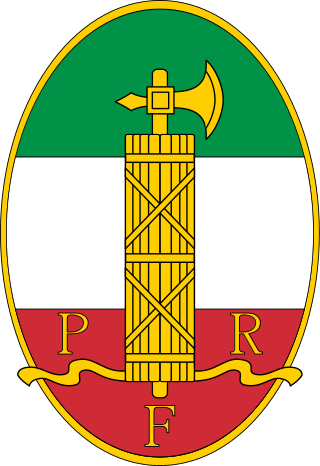
The Republican Fascist Party was a political party in Italy led by Benito Mussolini during the German occupation of Central and Northern Italy and was the sole legal representative party of the Italian Social Republic. The PFR was the successor to the National Fascist Party but was more influenced by pre-1922 early radical fascism and anti-monarchism, as its members considered King Victor Emmanuel III to be a traitor after his signing of the surrender to the Allies.
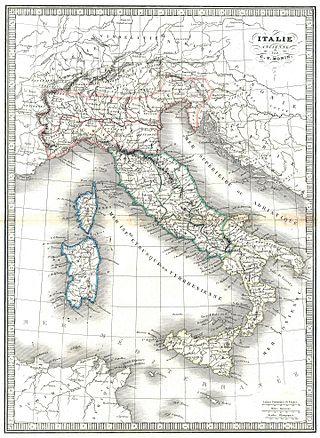
Italian fascism, also classical fascism and Fascism, is the original fascist ideology, which Giovanni Gentile and Benito Mussolini developed in Italy. The ideology of Italian Fascism is associated with a series of political parties led by Mussolini: the National Fascist Party (PNF), which governed the Kingdom of Italy from 1922 until 1943, and the Republican Fascist Party (PFR), which governed the Italian Social Republic from 1943 to 1945. Italian fascism also is associated with the post–war Italian Social Movement (MSI) and later Italian neo-fascist political organisations.
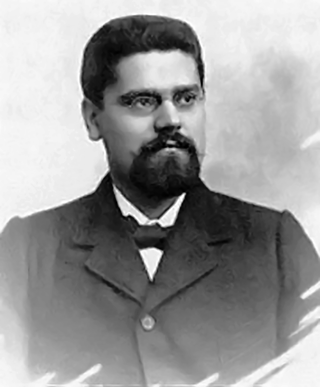
The "Manifesto of Fascist Intellectuals", by the actualist philosopher Giovanni Gentile in 1925, formally established the political and ideologic foundations of Italian Fascism. It justifies the political violence of the Blackshirt paramilitaries of the National Fascist Party, in the revolutionary realisation of Italian Fascism as the authoritarian and totalitarian rėgime of Prime Minister Benito Mussolini, who ruled Italy as Il Duce, from 1922 to 1943.
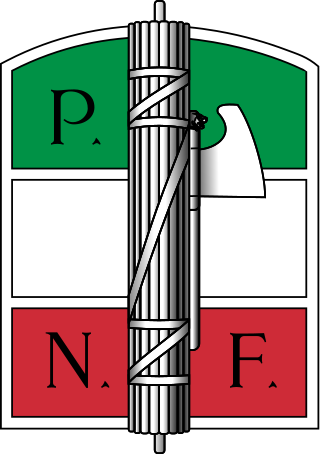
The National Fascist Party was a political party in Italy, created by Benito Mussolini as the political expression of Italian fascism and as a reorganisation of the previous Italian Fasces of Combat. The party ruled the Kingdom of Italy from 1922 when Fascists took power with the March on Rome until the fall of the Fascist regime in 1943, when Mussolini was deposed by the Grand Council of Fascism. The National Fascist Party was succeeded by the Republican Fascist Party in the territories under the control of the Italian Social Republic, and it was ultimately dissolved at the end of World War II.
Harold Elsdale Goad was a British writer, journalist and poet. He was an early sympathiser with fascism, publishing the pamphlet What is Fascism?, followed by two books on corporatism.
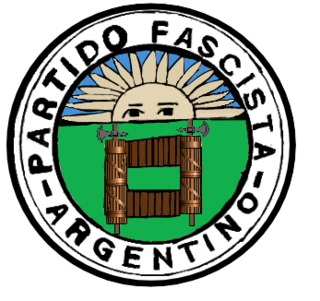
The Argentine Fascist Party was a fascist political party in Argentina from 1932 until its official disbandment in 1936, when it was succeeded by the National Fascist Union. Founded by Italian Argentines, the party was formed as a breakaway faction from Argentina's National Fascist Party. It was based upon Italian fascism and was recognized by Benito Mussolini's National Fascist Party in 1935. In the 1930s the party became a mass movement, particularly in the Córdoba reguon. Nicholás Vitelli led the PFA's branch in Córdoba until his death in 1934, when Nimio de Anquín took the leadership of the party.
British fascism is the form of fascism which is promoted by some political parties and movements in the United Kingdom. It is based on British ultranationalism and imperialism and had aspects of Italian fascism and Nazism both before and after World War II.
The Scottish Democratic Fascist Party (SDFP) or Scottish Fascist Democratic Party was a political party in Scotland. It was founded in 1933 out of the Scottish section of the New Party by William Weir Gilmour and Major Hume Sleigh.

Anti-fascism is a political movement in opposition to fascist ideologies, groups and individuals. Beginning in European countries in the 1920s, it was at its most significant shortly before and during World War II, where the Axis powers were opposed by many countries forming the Allies of World War II and dozens of resistance movements worldwide. Anti-fascism has been an element of movements across the political spectrum and holding many different political positions such as anarchism, communism, pacifism, republicanism, social democracy, socialism and syndicalism as well as centrist, conservative, liberal and nationalist viewpoints.

Fascist Italy is a term which is used in historiography to describe the Kingdom of Italy when it was governed by the National Fascist Party from 1922 to 1943 with Benito Mussolini as prime minister and dictator. The Italian Fascists imposed totalitarian rule and crushed political opposition, while simultaneously promoting economic modernization, traditional social values and a rapprochement with the Roman Catholic Church.
Richard C. Thurlow is a historian of Fascism in Britain. He is a graduate of the University of York and the University of Sussex and now an honorary lecturer at the University of Sheffield where he formerly taught.













